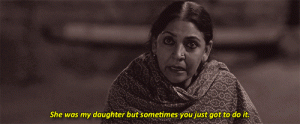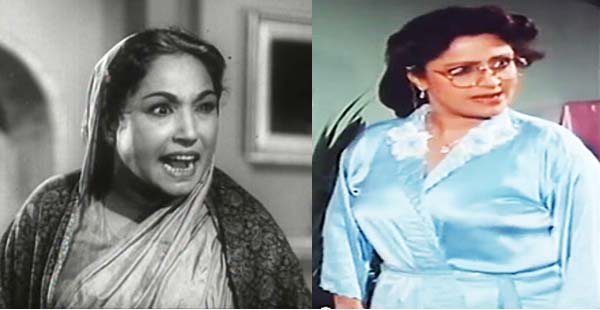Think of some iconic female villains from Hindi films: Lalita Pawar as the conniving, torturing mother-in-law; Bindu in her younger years as the seductive, husband-stealing vamp and then in her Pawaresque avatar in later films. In more recent years, we have seen the calculating and menacing Deepti Naval in NH10, who unapologetically has her daughter killed because she married outside her caste.
A simplistic, but incorrect, conclusion to draw from some of these depictions of on-screen female villainy is that women are women’s worst enemies. Indeed, I have lost count of the number of times I have heard this. Even though statistically more crimes are committed against men (especially murders) with men as the primary perpetrators, do we ever say that men are men’s worst enemies? Even the thought seems absurd!
Our confusion about why women often act against other women’s interests, despite our assumption of a universal sisterhood, can be clarified by unpacking a frequently overlooked, but essential concept in feminist theory called the Patriarchal Bargain. This is the key to understanding why and how women turn oppressors against other women, while being simultaneously oppressed within patriarchy. There are, of course, other intersectionalities such as caste, class, sexual orientation, disability, religion, and region which play a role in this process. However, I will not be discussing the contributions of those factors because the violence perpetrated against other women is often by intimate others such as mothers, mother-in-laws, friends, etc, and these might be best understood through the lens of patriarchal bargain.

The patriarchal bargain first appeared in 1988 in the work of Turkish feminist economist Deniz Kandiyoti. She examined two systems of male dominance under patriarchy: one a modified form of classic patriarchy from Sub-Saharan Africa and the other, she terms classic patriarchy from the Middle East, South Asia, and East Asia.
In the former, polygamy is the norm – a man has multiple wives, often with separate households for each of the women and her children. Women are responsible for much of the expenses of maintaining their households. So while the father may be responsible for certain key expenses like marriages or funerals or setting up a home on a plot of land, much of the daily expenses are often borne by individual wives.
The token torturer, is a woman, who has internalised societal patriarchal norms to such an extent that she is unable to reflect on the fact that the injustices rolled out by her are the same ones she once suffered from.
Kandiyoti’s research found that when land was reallocated under government schemes in these countries with men as the title holders, it put wives at odds with each other. If each wife and several of her children constitute a separate unit for which the wife is primarily responsible, then wives would inevitably be in a situation of trying to outcompete each other, to ensure their own unit’s viability. Colonisation and the decline in access to common land where women had inviolable rights to cultivation as well as the decline of traditional handicrafts in these regions, have intensified these problems, further disempowering women in this context, and in some cases turning them against one another.
In classic patriarchy (which will be more familiar to an Indian audience), a girl is given away in marriage by a male head of household to another household headed by the husband’s father. Kandiyoti writes, ‘There, they are subordinate not only to all the men but also to the more senior women, especially their mother-in-law. The extent to which this represents a total break with their kin group varies with the degree of endogamy in marriage practices and different conceptions of honour.’ Thus, women are subordinated to men, and younger women are subordinated to older women and older men often subordinate younger men.
In systems of marriage where cross-cousin marriages are permissible, and maybe preferred (the Dravidian system or in Muslim marriages), there may be marginally greater protection for girls since she is not a ‘stranger-bride‘, but in communities where caste rules forbid marriage between members of the same village (in the vast majority of Northern and Eastern Hindu villages), a girl in an arranged marriage situation enters her husband’s household under extremely unfavourable terms.
Also Read: Motherhood and Benevolent Misogyny
Kandiyoti argues that whether a culture follows the practice of dowry or bride price, it doesn’t matter as far as her power within the husband’s household is concerned. Despite legal entitlements to ancestral property, women seldom raise claims of inheritance because it has the potential to sour their relationship with their brothers. Common sense and experience dictate that alienating one’s natal family is not a good idea, since they may end up being the only source of support, if things deteriorate in husbands’ homes.
Kandiyoti says the mechanism by which a young bride may slowly begin to consolidate some status within this patrilineal and patriarchal set-up is by producing male heirs since the system appropriates and invisibilises women’s labour. Crucially, she argues ‘women‘s life cycle in the patriarchal extended family is such that the deprivation and hardship she experiences as a young bride is eventually superseded by the control and authority she will have over her subservient daughters-in-law. The cyclical nature of women’s power in the household and their anticipation of inheriting the authority of senior women encourages a thorough internalisation of this form of patriarchy by the women themselves.‘
As difficult as it is for us to imagine this scenario, Lalita Pawar was indeed a dispossessed young woman at some point in her life, who has assumed the role of the ‘token torturer‘. The token torturer, usually a woman, has internalised patriarchal norms to such a great extent that she is not able to or unwilling to reflect on the fact that the injustices perpetrated against her as a young bride are the same ones she may be perpetrating against her daughter-in-law. By wielding power in this manner, she consolidates her somewhat tenuous position within patriarchy.
If we examine the words individually, bargain is a process of negotiation sometimes involving compromise for one or both parties, where both stand to profit from that negotiation. Thus, there’s a continuous negotiation that women undertake, much of which is not conscious, to have access to some power within patriarchy.
This can help explain a whole range of confusing and contradictory actions. Mothers police their daughters with much greater scrutiny than fathers. It’s not only because they are being socialised into appropriate femininity but because transgressions are expensive for mothers too – it reflects badly on their mothering for which they will be severely reprimanded by husbands, in-laws, extended family, neighbours and the world. As one new mum and close friend said, ‘When you become a mother, you become common property. Where advice is concerned, everyone and their mothers think they can teach you how to become a better mother, and you can never do anything right!‘
I recall making an unbreakable vow to my mother as a sixteen-year-old who had supported my decision to go to a college far from home with a reputation for ‘girls gone wild’, against my father’s choice to send me to an all-girls’ Christian college. I promised that I wouldn’t do anything, so she loses face. And true to my promise, my junior college life ran with clock-like precision – classes, library for one hour, back home by 6 pm with just a handful of outings spread across those two years.
In the years since, my father has loosened up (a lot), but my mother, though, oscillates between taking feminist positions and making bold choices and joining in the clamour for ‘well-behaved‘ bahus. They have both come a long way, but I sympathise with my mother’s dilemma as she continues to remind me and my sister, even today, ‘No one will blame Baba if something (bad) happens. Everyone will say she was a stay-at-home Mom. Look at how she has brought up her daughters?!’
Mothers police their daughters with much greater scrutiny than fathers because in case of any mishap fingers would be pointed at her.
Moral policing of daughters by mothers and mother-like figures is not the only example of patriarchal bargain. We all know that the sole purpose of the existence of most neighbourhood aunties is to notify our mothers of any transgressive behaviour. The most vocal critics of women are often their female friends and acquaintances. No part of our lives is not open to criticism from our female counterparts.
In her excellent book Fat Talk: What Girls and their Parents say on Dieting, anthropologist Mimi Nichter illustrates that young girls learn to hate their bodies by observing mostly older women, often Mums, and their friends. There are plenty of similar examples, some with fatal consequences, such as female genital mutilation (FGM), bride-burning, communal riots, where women have taken the centre-stage in perpetrating brutal and lethal violence against each other.
So why do women continue to do this? As I have discussed earlier, given women’s delicate foothold on power within patriarchy, it makes sense for them to do what they can to retain whatever little authority they have. The first step to changing the terms of engagement is, of course, to be aware of what these terms are! So, as a start, if we all rein in our inner fausts or aunties (yes, we all have one, that is a function of conditioning), the result would be fewer judgements and greater affirmations and less bargaining with patriarchy.
Also Read: I Wish My Mother’s House Had Taught Me Feminism
Featured Credit Image: bollywoodlife.com
About the author(s)
Sreeparna Chattopadhyay has a Ph.D. in Cultural Anthropology from Brown University with research interests in gender and its intersections with health, education family and the law. She is an independent researcher.





Insightful. Thank you.
Brilliant article..Thank you for further enhancing and clarifying my perspective..!!
Wonderful read! and quite insightfull. I really like the way the arguments and the facts have been expressed. We women always think about these things but hardly know how to express them or in other words, we don’t know how to express them. Thanks for the expressions.
Concept of patriarchal bargain is actually answer to many related questions. Love the article.????